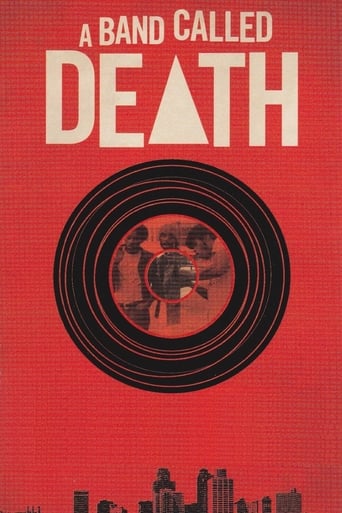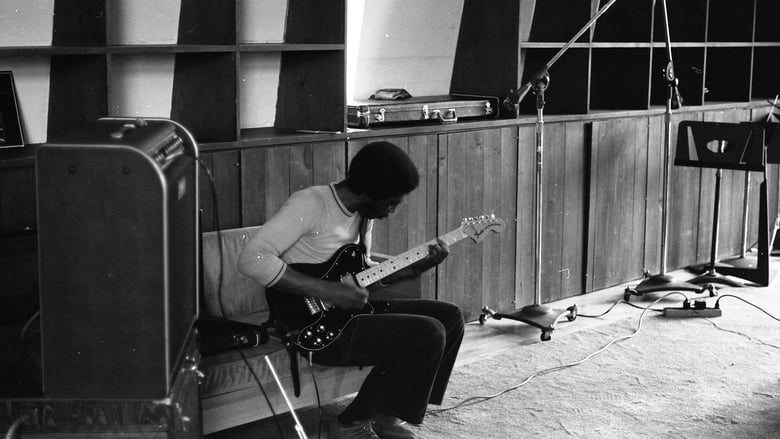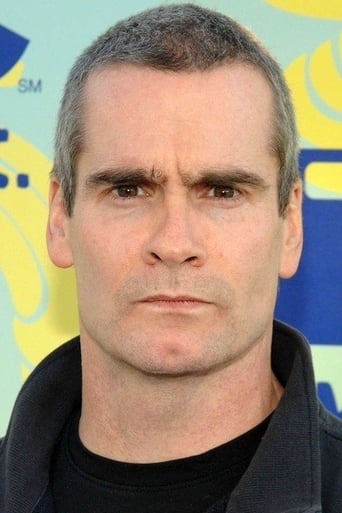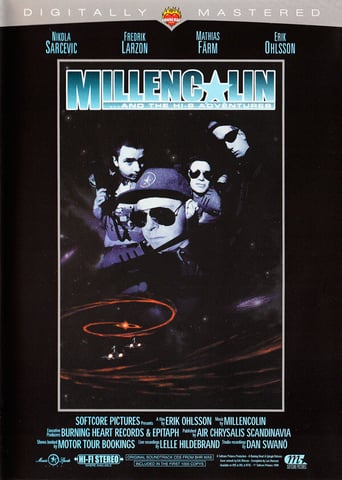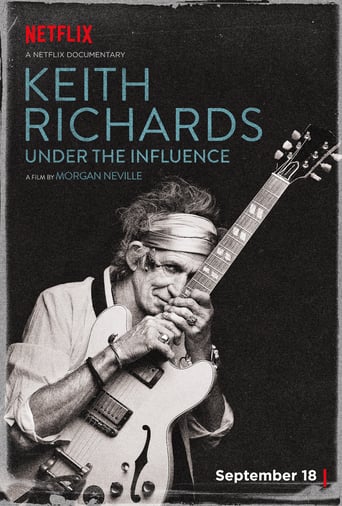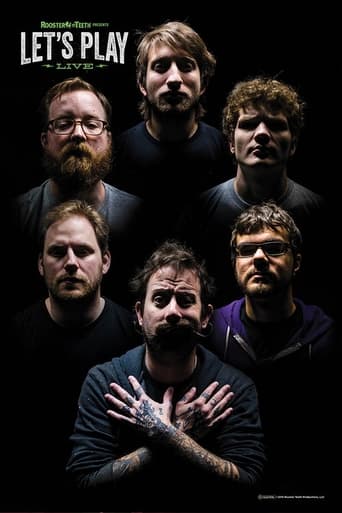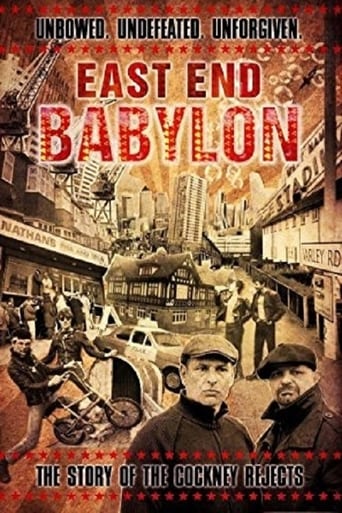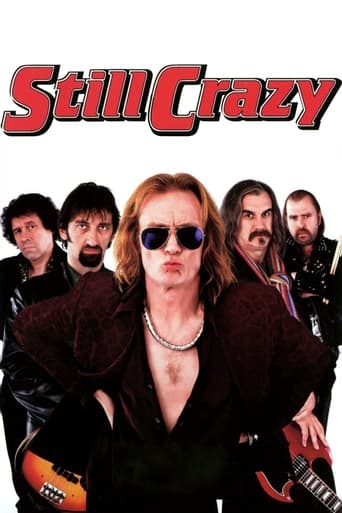A Band Called Death (2013)
Before Bad Brains, the Sex Pistols or even the Ramones, there was Death. Formed in the early '70s by three teenage brothers from Detroit, Death is credited as being the first black punk band, and the Hackney brothers, David, Bobby, and Dannis, are now considered pioneers in their field. But it wasn’t until recently — when a dusty 1974 demo tape made its way out of Bobby’s attic nearly 30 years after Death’s heyday — that anyone outside a small group of punk enthusiasts had even heard of them.
Watch Trailer
Free Trial Channels
Cast


Similar titles
Reviews
One of the best films i have seen
Clever, believable, and super fun to watch. It totally has replay value.
Story: It's very simple but honestly that is fine.
Blistering performances.
If, by the title, you suppose this is a documentary about sour grapes, i.e., some pre-Ramones, The Clash, or even The Sex Pistols punk band that never got its props, you're mistaken. There's not an iota of bitterness among these guys who stubbornly defied all odds, most of which were housed in their home town Motor City. I mean, what could have possessed three black teenage brothers to think they could form a prototype punk rock band just blocks away from Berry Gordy's mellow soul factory known as Hitsville USA? Having nothing more than British rock band singles, insurance-money instruments, and cloud formations to guide them, DEATH did it. (Note to my friendly reviewers: they weren't just the prototypical "black" punk rock group, but the forerunning "punk rock group" of any color...period.) But being so original, so very far ahead of the curve, came at a cost. Now therein lies the supremely inspirational message of "A Band Called Death" that anyone can leap into like a mosh pit. It took thirty-five years--35 friggin' years!--before surviving brothers Bobby and Dannis got their recognition. Sadly, David, the group's visionary, passed away years earlier, emotionally drained and physically terminal. Although only old tapes of David are featured in the film, his haunting presence throughout the film is undeniable. By the time you hear David's son share his emotions about hearing his deceased father's voice on a cult-hit record, you'll choke back tears. Even if you're not a punker, a funker, or a rocker, you owe it to yourself to check out this inspiring documentary. Dreams deferred don't always shrivel, sometimes they hibernate. So if you miss DEATH's story this time around, the group will wait, patiently, for as long as it takes. They're accustomed sleepers. But mark AfroPixFlix's words (and his nine forks of good judgment), you'll not long be able to escape DEATH's grip.
Stuck in the shadow of Searching for Sugar Man, this tale of an all-black protopunk band from Detroit hits many of the same notes, but plays its own tune. This is a film whose appeal may be more limited than Sugar Man due to the hard and raw style of the band in question, but the music unearthed is no less vital.Death's story is told mostly from the perspective of Bobby and Dannis Hackney, the bassist/vocalist and drummer, respectively. They recount the birth of Death and walk you through some of the places of note. We're robbed of the opportunity to hear from who we learn is the driving force behind the band, guitarist David Hackney, who sadly passed away from lung cancer in 2000. He does make appearances in the movie in the form of audio recordings and you get a sense of the unique viewpoint that gave the band its vision through these recordings and his brothers' recollections.It's that vision that shaped Death, and ultimately, limited their potential. Being steadfast about not changing the name of the band, David felt the name went with the concept he had for the band and, as such, he was resolute. Even when record mogul Clive Davis came knocking – loving the music but hating the name – David chose to pass the opportunity by rather than compromise. This, in a nutshell, is the answer to the great mystery of how they were deprived their stardom. Fortunately, the film has more to offer than that.It's watching Bobby's sons, and the effect his early music has on them that provides the film with its heart and makes it more than a just sad story about how elusive fame may be. Their drive and determination to get their father's music out by-any-means-necessary is inspiring to watch. The excitement with which they recall finding out their dad is a rock pioneer is written all over their faces. Bobby had instilled in his sons a deep appreciation of music of all kinds, just like his father had done for him, and it turned out they appreciated his music most of all.Sounding like Love, The Who, Buzzcocks, The Saints, The Damned and The Real Kids all playing with The Stooges' gear, it's easy to see why there was so much excitement for Death's recent rediscovery. Chance plays such a big part in any musical success, it's little wonder that so many great artists fall through the cracks. One supposes that with the success of Searching for Sugar Man, these documentaries attempting to right musical wrongs might become their own subgenre. If that's the case, you can count me as an early enthusiast. These stories speak to the longevity of art and the way it sits there patiently, waiting to be discovered and the magic that happens when you do. As Henry Rollins puts it, "It's one of those things that keeps you going to the record store hoping for another great story like that."
In recent years there seems to have been a cycle of music documentaries about musicians of whom success has eluded. In Anvil: the Story of Anvil we have a band who have had extremely limited success over a very long period, in Searching for Sugarman we have an artist who had extremely minor success and then disappeared only to be rediscovered a quarter of a century later to great acclaim and in 20 Feet from Stardom we have the story of singers whose work we hear everywhere but of whom remain unfairly obscure. A Band Called Death contains elements of all of these documentaries, except in this one the band didn't even release an album until 35 years after their initial demo.Death were a Detroit proto-punk band. Not only that but they were an all-black proto-punk band, which makes them very unique. There were very few black musicians operating in this area of music back in the 70's. Its details like this that makes their story all the more unusual. Having heard their music, I have to say it was pretty good. Forget proto-punk, this stuff sounded more like post-punk. Its combination of aggression with tight highly skilled musicianship was certainly ahead of its time and sounds more like the more expansive alternative rock that followed in the wake of the punk years. I suppose, looking back on it, being so ahead of their time was one of the problems the band had in getting a record deal. Likewise, their name was a major handicap. Band leader David Hackney conceived of the name and insisted on it being retained at all costs. This of course led to the group losing the one record contract they were offered. It is testament to David's principles but it does seem like a self-defeating stance, as it's the music that counts most, the name is so much less important and we are left wondering what could have been. Of course, a name like 'Death' and music such as theirs is entirely in-step with today's contemporary alternative rock, which is why they were rediscovered to such fanfare. It's great to see them finally have their time in the sun.The two surviving brothers are genuinely good blokes and we learn most of the story of the band from them. Their brother David died some time round about the year 2000 of lung cancer, so there is a bittersweet nature to the band's late acceptance and success. David was the main visionary of the band. He was a dreamer. It is sad that he never saw the band achieve its long-overdue success but until his dying day he always was convinced that one day people would come looking for their music. And he was proved correct. The film perhaps falls a bit short in detailing the Detroit rock scene of the time. It almost paints a picture where Death were the lone purveyors of this kind of confrontational rock music. This makes them seem more unique but it would have been good if the documentary at least acknowledged fellow Detroit pioneers such as The Stooges and The MC5. It would have put the band and Detroit itself into a bit more historical context. Also, it would have been interesting to know if they had a local following at the time and played any gigs. But, despite these minor issues, the film is still very successful because these guys were genuinely good and it's not a rose tinted spectacle affair. The film also functions as a mechanism for their music to reach an even wider audience and this in itself is a good enough reason for its existence. But the main thing is that now Death have been added to the rock family tree as an important precursor to punk and alternative rock. Even if, in the final analysis, none of that changes the fact that 'Death' is still a terrible name for a band
In the past few years, there have been very good documentaries on great musicians who just missed success. First came "The Devil and Daniel Johnston" about the mentally ill genius of the '80's alt-rock scene. Then "The Story of Anvil" about Canada's greatest forgotten metal band. Then there was last year's Oscar-winning "Searching for Sugarman" about Rodriguez, the '60's folk-pop singer who became an icon in South Africa, but nowhere else. And now there is "A Band Called Death" about an early punk band from Detroit that by rights should have gotten the same recognition as the Stooges or MC5.Nominally, this is a film about punk rock, but really it's about family. That's because the original line-up of Death was three brothers: Dannis Hackney--a drummer into Alice Cooper; Bobby Hackney--the bassist/lead vocalist who grew up wanting to be like Paul McCartney; and the late David Hackney, a guitarist who successfully tried to create a playing style that was a cross between Pete Townshend and Jimi Hendrix. Dannis and Bobby still reminisce and tell stories about the early days as only family members can. The Hackney family is very close-knit and deeply religious, as well as musical.It was David who came up with the name of the band and wrote all their songs--many of which had spiritual themes. And it was David who kept them from success during his lifetime. After they recorded their album, they shopped it to all the major labels. Clive Davis of Arista records was ready to sign them if they only changed the name of the group. David refused, and so the band went unsigned. After that, they moved to Vermont where the police would tear down their fliers under the mistaken idea that they were gang-related propaganda. When they did finally change their name, they were still hard-pressed to get gigs because of the religious content of their lyrics. So David left and moved back to Detroit where he developed twin addictions to alcohol and cigarettes, eventually dying of lung cancer in 2000. Meanwhile, Bobby and Dannis formed the reggae band Lambsbread, where religious lyrics are more acceptable.Fast forward to 2008: Bobby's sons--Bobby Jr, Julian and Urian become aware of these MP3's online from an early hardcore punk band called Death. Already huge punk fans, they (separately) listen to what they think is the best rock music they've ever heard. And when the vocals come in, they realize they're listening to their dad and uncles. So they learn the songs themselves, and form a Death tribute band called Rough Francis. Which inspires Bobby Sr and Dannis to re-form Death with a new guitarist.As I said in an earlier paragraph, this movie is not so much about the band Death, but the Hackney family. Their love and loyalty towards each other radiates off the screen. One of the main interviewees is their older brother Earl who was not part of the band. They cry when they talk about David. They laugh when they remember what they were like as kids. When their mother dies during filming, we in the audience are nearly as devastated as they are. The only change I would have liked to see would have been interview footage with David. But of course, that doesn't exist, so all we're left with is the awesome music he wrote.

